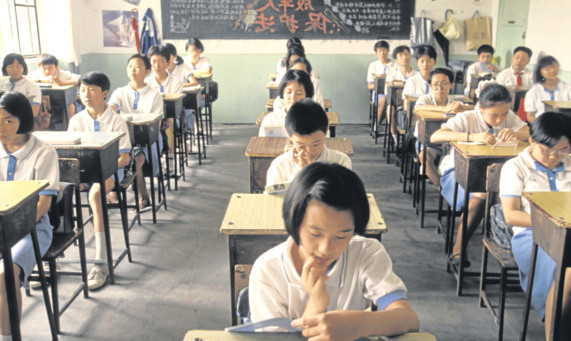
Oh dear. The OECD last week published its global educational standards report and the UK came in a pathetic 26th out of the 65 participating nations.
In other words a fail!
It wasn’t quite bad enough to be sent to the naughty corner, but as Sir might say at a parents’ evening: “The signs are very worrying and unless little GB shows more application, he’ll find it very hard to be a success in the future.”
What a humbling, humiliating position for the UK the once great powerhouse of Western learning to now find itself in.
The only plus point was that the USA dolefully trudged in at 36.
The little brain boxes of the Far East scooped most of the dux awards, with the top five diplomas for excellence being presented to Shanghai, Singapore, Hong Kong, Taiwan and South Korea.
So why are we in the West, and by that I mean the UK and the USA, so behind in our standards of education and schooling?
Why are our children under-achieving little dumplings? Where have we gone wrong?
For someone who spent as much time playing truant as he did attending lessons, I’m probably not the best person to ask. I did pass most of my exams though, as did most of my fellow pupils.
And without wanting to put too much of a shine on my rose tinted glasses it definitely seemed we were more up for a challenge than most of the kids are today.
We walked to school in all weathers, we weren’t dropped off by car and we were taught the four R’s, not three ’reading, ’riting, ’rithmetic
. . . and a sore one if you mucked up!
Exams were rigorously enforced and sat, regardless of age and ability, and if you failed you were told you had failed, not mollycoddled.
Sports day had winners and losers, unlike today with everyone and their granny being congratulated even if they’re totally pants!
There was a distinction back then between success and failure. And that, in my opinion, has gone.
As for application, spirit and the drive to win, for far too many of our kids that has now been replaced with a shrug of the shoulders and a “who gives a fig” attitude.
That has to be addressed by government and push-over mums and dads the gogglebox parents who themselves have been brought up on a diet of fast food, games consoles and humongous tellies.
The answer though is not to copy the Far East winners countries whose children are never seen or heard because they are always in school studying. Countries whose suicide rates among their young also top the league tables.
No, that is definitely not the answer.
Maybe the answer is that we all concentrate on getting the educational environment right for our children, as it seems to be all over the place at the moment.
A winning mentality and hard work must be encouraged, not frowned upon.
I don’t mean we marginalise those who don’t come up to scratch not everyone is an academic but we try and find out what it is they are good at and encourage them to succeed in their chosen field instead of leaving them at the bottom of the heap.
In the meantime let’s stop our schools being so PC and embarrassingly sensitive. We should leave that to the Americans.
Let’s lift our game. There’s nothing wrong with trying to win and be the best just as long as you don’t give up trying !
It’s an attribute we once had so much off you could bottle it . . . and now we just seem to bottle it.

Enjoy the convenience of having The Sunday Post delivered as a digital ePaper straight to your smartphone, tablet or computer.
Subscribe for only £5.49 a month and enjoy all the benefits of the printed paper as a digital replica.
Subscribe